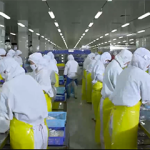American consumers continue to be concerned about seafood contamination, labor issues

Americans' concerns regarding seafood include issues of forced labor, contamination of antibiotic, heavy metals, and plastics, and overfishing, a new survey has found.
The new data indicates that over three-quarters of American consumers are concerned about various issues related to seafood, with slightly more concerned about heavy metal, mercury, and plastics than issues like forced labor and overfishing. Seafood buyers and menu decision-makers also indicated concerns, but those concerns were more related to overfishing and the use of slave labor than other issues.
Most American consumers are concerned about the impact of ocean health on fish and seafood, Changing Tastes found in new research that will be released later this year. Younger consumers are more concerned about ocean health issues compared to those born before 1964, Changing Tastes found.
Heavy metals are at the forefront of the American consumers' thoughts, with 85 percent of respondents indicating they are “somewhat” or “very” concerned about mercury in fish and seafood. Other concerns related to pollution weren’t far behind: 83 percent are concerned about plastic pollution, 83 percent are concerned about heavy metals, and 78 percent are concerned about radiation.
The concerns related to other issues weren’t far behind: 76 percent are worried about forced labor, 79 percent are concerned about antibiotics, and 80 percent are worried about overfishing.
“We are seeing new concerns about the health of our oceans such as plastic waste and radiation reshaping how Americans think about eating fish and seafood, as well as their openness to new ways of producing fish and seafood including advanced aquaculture such as cellular production,” Changing Tastes Founder and Managing Director Arlin Wasserman told SeafoodSource.
Purchasing and menu decision-makers share consumers’ ocean health concerns, but rank them differently in order of importance: 90 percent of them are somewhat or very concerned about mercury in seafood, followed by 83 percent concerned by plastic, 85 percent by overfishing, 79 percent by antibiotic use, and 76 percent by use of slave labor.
Some of the issues on the minds of consumers are ones the seafood industry can address and remedy in part, or entirely on their own – such as slave labor or eliminating the use of plastic in fishing gear – Changing Tastes Seafood Sustainability Consultant Jada Tullos said.
“But others, such as high levels of mercury in wild-caught fish, cannot be readily addressed by a single company or the fishing industry alone,” Tullos said. “Because of this, consumers are becoming increasingly concerned with wild-capture fishing compared to farmed.”
Changing Tastes found that older consumers continue to prefer wild-caught fish and seafood more than younger consumers. Consumers born after 1964 are significantly more likely to consider farmed fish and seafood including cellular aquaculture, with 47 percent indicating it is acceptable compared to just 22 percent of older Americans.
“The conventional wisdom that Americans prefer wild fish and consider it a healthier choice used to be true, and it still is among older Americans. But that’s not as prevalent a belief among younger generations,” Wasserman said.
More than half of millennials, 54 percent, consider all forms of aquaculture to be acceptable, including cellular production.
“Having about 30 percent of Americans ready to replace wild fish and seafood with cellular products is a remarkable level of acceptance, especially considering the products are not yet in market,” Wasserman said.
Americans born before 1964 are more likely to think of fish and seafood as heart-health and rich in Omega 3s than those born after 1964, and about twice as likely than those born after 1997 (Generation Z), Changing Tastes found.
Regardless of age, only about one in five adults consider fish and seafood to be safer to eat than other protein choices or better for the environment.
“Consumers are becoming more aware of the interconnection between ocean health and their own health through eating fish and seafood,” Wasserman said. “As they become more concerned about the health of the oceans, Americans are increasingly accepting of other production methods that produce food that is clean and free of contamination like plastics and heavy metals.”
Photo courtesy of Dragon Images/Shutterstock






Share